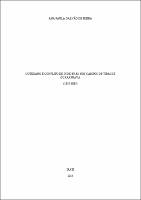| Compartilhamento |


|
Use este identificador para citar ou linkar para este item:
http://tede.unicentro.br:8080/jspui/handle/tede/260Registro completo de metadados
| Campo DC | Valor | Idioma |
|---|---|---|
| dc.creator | Meira, Ana Paula Galvão de | - |
| dc.creator.Lattes | http://lattes.cnpq.br/5620209790767350 | por |
| dc.contributor.advisor1 | Lino, Jaisson Teixeira | - |
| dc.contributor.advisor1Lattes | http://lattes.cnpq.br/4846026270176674 | por |
| dc.date.accessioned | 2016-09-20T12:13:32Z | - |
| dc.date.available | 2016-02-22 | - |
| dc.date.issued | 2015-10-13 | - |
| dc.identifier.citation | MEIRA, Ana Paula Galvão de. COTIDIANO E CONFLITO DE INDÍGENAS NOS CAMPOS DE TIBAGI E GUARAPUAVA (1855-1885). 2015. 138 f. Dissertação (Mestrado em História e Regiões) - UNICENTRO - Universidade Estadual do Centro Oeste, Irati, 2015. | por |
| dc.identifier.uri | http://localhost:8080/tede/handle/tede/260 | - |
| dc.description.resumo | Os vestígios históricos dos grupos humanos interferem na compreensão e análise destes, pelos pesquisadores. No que concerne os indígenas brasileiros, a produção sobre os mesmos sempre esteve a critério de um interlocutor, pois, não dependiam de uma cultura escrita para orientar-se nas suas práticas milenares. A oralidade era o meio de acesso às informações necessárias e o processo de inserção nos grupos de acordo com suas tradições. Analisar as intervenções de um grupo humano, através apenas de documentos produzidos por um agente externo, é desafiador. Os documentos produzidos a partir do século XIX influenciaram pontualmente nas transformações da etnohistória. A preocupação governamental com o `problema` dos selvagens, que impediam a expansão migratória do progresso nacional, colaborou na gama de relatórios, ofícios, regulamentações e leis que, atualmente, nos permite visualizar o indígena atuando no contexto histórico. Filtrar as informações depreciativas e buscar problematizar as práticas de resistência dos indígenas tem sido uma das alternativas dos historiadores. Fora um dos principais objetivos no decorrer deste trabalho, busca-lo inserir no processo histórico da construção historiográfica indígena. Através do princípio de cotidiano estabelecido por Michel de Certeau, objetivou-se refletir sobre as táticas dos indígenas, a partir da análise de crimes registrados nas regiões dos Campos de Tibagi e Guarapuava, entre 1855 a 1885, envolvendo tais agentes. | por |
| dc.description.abstract | The historical remains of human groups interfere in the understanding and analysis of these, by the researchers. In relation to the Brazilian Indians, production on them always at the discretion of a party therefore did not depend on a written culture to orient themselves in their ancient practices. The orality was the means of access to the necessary information and the insertion process in groups according to their traditions. Analyze the intervention of a human group through only documents produced by an outside agency, is challenging. Documents produced from the nineteenth century occasionally influenced the transformation of ethnohistory. The government`s concern with the `problem` of savages, that prevented the migratory expansion of national progress, collaborated in the range of reports, crafts, regulations and laws that currently allows us to visualize the Indian acting in historical context. Filter derogatory and seek discuss indigenous resistance of practical information has been one of the alternatives of historians. Was one of the main objectives in this paper, we try to insert it in the historical process of Indian historiographical construction. Through the daily life of principle established by Michel de Certeau, is aimed to reflect on the tactics of the natives, from the analysis of crimes recorded in the regions of Tibagi and Guarapuava fields, between 1855-1885, involving such agents. | eng |
| dc.description.provenance | Made available in DSpace on 2016-09-20T12:13:32Z (GMT). No. of bitstreams: 1 PR ANA PAULA GALVAO DE MEIRA.pdf: 2468849 bytes, checksum: 0bde849daf2cc6c2db6134dce6db9434 (MD5) Previous issue date: 2015-10-13 | eng |
| dc.description.sponsorship | Coordenação de Aperfeiçoamento de Pessoal de Nível Superior - CAPES | - |
| dc.format | application/pdf | por |
| dc.thumbnail.url | http://localhost:8080/tede/retrieve/1057/PR%20ANA%20PAULA%20GALVAO%20DE%20MEIRA.pdf.jpg | * |
| dc.language | por | por |
| dc.publisher | UNICENTRO - Universidade Estadual do Centro Oeste | por |
| dc.publisher.department | Unicentro::Departamento de História | por |
| dc.publisher.country | BR | por |
| dc.publisher.initials | UNICENTRO | por |
| dc.publisher.program | Programa de Pós-Graduação em História (Mestrado) | por |
| dc.rights | Acesso Aberto | por |
| dc.subject | Historiografia indígena | por |
| dc.subject | Indígenas | por |
| dc.subject | Cotidiano | por |
| dc.subject | Paraná | por |
| dc.subject | Crimes | por |
| dc.subject | Indian historiography | eng |
| dc.subject | Indigenous | eng |
| dc.subject | Daily Life | eng |
| dc.subject | Paraná | eng |
| dc.subject | Crimes | eng |
| dc.subject.cnpq | CIENCIAS HUMANAS | por |
| dc.subject.cnpq | CIENCIAS HUMANAS::HISTORIA | por |
| dc.title | COTIDIANO E CONFLITO DE INDÍGENAS NOS CAMPOS DE TIBAGI E GUARAPUAVA (1855-1885) | por |
| dc.title.alternative | não consta | eng |
| dc.type | Dissertação | por |
| Aparece nas coleções: | Programa de Pós-Graduação em História | |
Arquivos associados a este item:
| Arquivo | Descrição | Tamanho | Formato | |
|---|---|---|---|---|
| PR ANA PAULA GALVAO DE MEIRA.pdf | 2,41 MB | Adobe PDF |  Baixar/Abrir Pré-Visualizar |
Os itens no repositório estão protegidos por copyright, com todos os direitos reservados, salvo quando é indicado o contrário.




